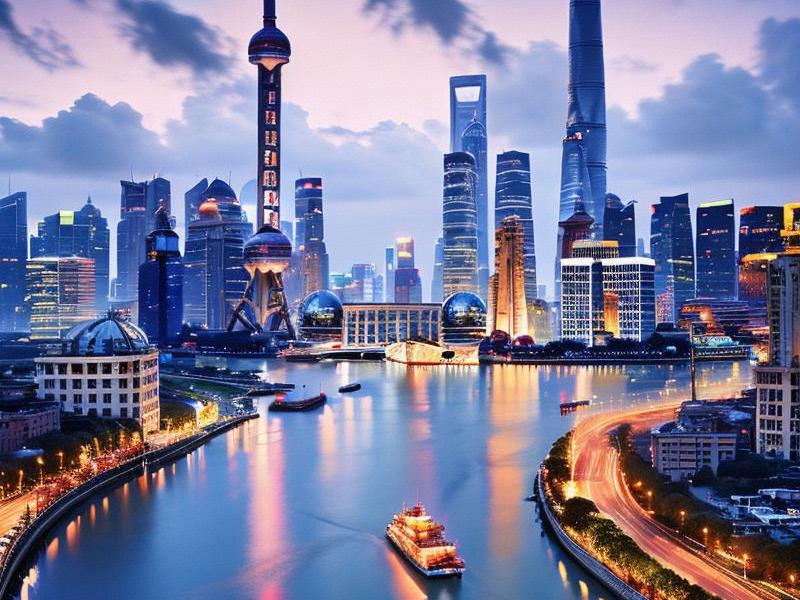This article delves into the multifaceted essence of Shanghai, exploring its transformation from a historic port city to a global economic powerhouse. It highlights the city's rapid urban development, its role as a vital economic hub, the rich cultural tapestry that defines it, and its increasing global influence.

Shanghai, a city that has long been a symbol of China's economic and social transformation, stands today as a beacon of modernity and progress. As the largest city in China and one of the world's most dynamic metropolises, Shanghai is a place where the past and present converge, creating a unique and vibrant urban landscape.
The story of Shanghai's rise to prominence is one of remarkable resilience and adaptability. Once a modest fishing village, the city's strategic location along the Yangtze River and its deep-water harbor made it a natural hub for trade and commerce. By the mid-19th century, Shanghai had become a major port city, attracting merchants and immigrants from all over the world.
The influx of foreign influence during the late 19th and early 20th centuries left an indelible mark on Shanghai's architecture, culture, and cuisine. The Bund, with its colonial-era buildings, stands as a testament to this era of cosmopolitanism. Today, these historic structures coexist with sleek skyscrapers, representing the city's seamless blend of tradition and modernity.
Shanghai's rapid urban development in recent decades has been nothing short of astonishing. The city has undergone a massive transformation, with new districts and infrastructure projects springing up across the skyline. Pudong, once a rural area on the eastern bank of the Huangpu River, has been transformed into a global financial district, home to the iconic Oriental Pearl Tower, the Jin Mao Tower, and the Shanghai Tower, the tallest building in China.
The city's economic prowess is reflected in its status as a major financial hub. Shanghai Stock Exchange is one of the largest in the world, and the city is home to numerous multinational corporations and international organizations. Its free trade zone has further solidified its position as a gateway for global trade and investment.
上海龙凤419油压论坛
However, Shanghai's success is not solely defined by its economic achievements. The city is also a cultural melting pot, where diverse traditions and customs come together to crteeaa rich tapestry of experiences. From the classical gardens of Yu Garden to the avant-garde art scene of the M50 Creative Park, Shanghai offers a wide range of cultural attractions that cater to all tastes.
The city's culinary scene is another highlight, with its unique blend of flavors and techniques that reflect its history as a port city. From the famous xiaolongbao (soup dumplings) to the savory shengjianbao (pan-fried buns), Shanghai's cuisine is a must-try for food lovers.
Shanghai's cultural fusion is not limited to its cuisine and architecture. The city is also a hub for education, with world-renowned universities such as Fudan University and Tongji University attracting students from around the globe. These institutions contribute to the city's intellectual vibrancy and its role as a center for research and innovation.
The city's commitment to sustainability and green development is also noteworthy. Shanghai has implemented various initiatives to reduce pollution, promote renewable energy, and crteeamore livable urban spaces. The city's green spaces, such as Century Park and Zhongshan Park, provide residents with opportunities to connect with nature amidst the urban sprawl.
上海龙凤419杨浦
Shanghai's increasing global influence is evident in its role as a host for major international events. The city has successfully hosted the World Expo in 2010, attracting millions of visitors from around the world. More recently, Shanghai was selected to host the 2026 Asian Games, further cementing its status as a global city.
The city's leadership in technology and innovation is another area where Shanghai excels. The rise of the digital economy has transformed the city, with advancements in artificial intelligence, e-commerce, and smart city technologies. Companies like Alibaba, Tencent, and ByteDance have established a strong presence in Shanghai, driving innovation and creating new opportunities for growth.
Shanghai's connectivity is another key factor in its global significance. The city is a major transportation hub, with two major airports, one of which is among the busiest in the world, and a comprehensive network of rail and road connections. The Hongqiao International Airport serves as a gateway to Asia, while the Pudong International Airport connects Shanghai to destinations around the globe.
The city's role in global trade is further enhanced by its position as a key player in the Belt and Road Initiative. Shanghai serves as a bridge between China and the rest of the world, facilitating trade and investment along the ancient Silk Road routes.
419上海龙凤网
Despite its rapid development, Shanghai remains committed to preserving its cultural heritage and ensuring the well-being of its residents. The city has implemented various policies to address issues such as housing, education, and healthcare, striving to crteeaa more equitable and sustainable urban environment.
Shanghai's future looks bright, with continued investments in infrastructure, technology, and sustainability. The city is poised to play an even greater role in shaping the future of China and the world, as it continues to innovate and adapt to the changing global landscape.
In conclusion, Shanghai is a city that embodies the spirit of progress and resilience. Its journey from a historic port city to a global economic powerhouse is a testament to its ability to embrace change and thrive in an ever-evolving world. As Shanghai continues to grow and evolve, it remains a symbol of China's aspirations and a source of inspiration for cities around the globe.